Related Research Articles
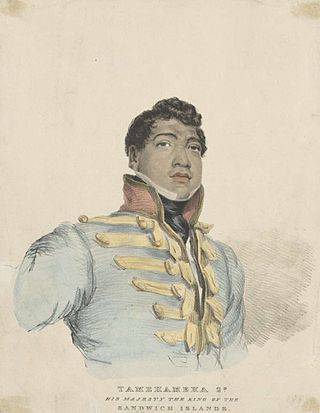
Kamehameha II was the second king of the Kingdom of Hawaii. His birth name was Liholiho and full name was Kalaninui kua Liholiho i ke kapu ʻIolani. It was lengthened to Kalani Kaleiʻaimoku o Kaiwikapu o Laʻamea i Kauikawekiu Ahilapalapa Kealiʻi Kauinamoku o Kahekili Kalaninui i Mamao ʻIolani i Ka Liholiho when he took the throne.

Kalākaua, sometimes called The Merrie Monarch, was the last king and penultimate monarch of the Kingdom of Hawaiʻi, reigning from February 12, 1874, until his death in 1891. Succeeding Lunalilo, he was elected to the vacant throne of Hawaiʻi against Queen Emma. Kalākaua had a convivial personality and enjoyed entertaining guests with his singing and ukulele playing. At his coronation and his birthday jubilee, the hula, which had hitherto been banned in public in the kingdom, became a celebration of Hawaiian culture.

Lunalilo was the sixth monarch of the Kingdom of Hawaii from his election on January 8, 1873, until his death a year later.

The Hawaiʻi State Library is a historic building in Honolulu, Hawaii, that serves as the seat of the Hawaiʻi State Public Library System, the only statewide library system and one of the largest in the United States. The Hawaiʻi State Library building is located in downtown Honolulu, adjacent to ʻIolani Palace and the Hawaiʻi State Capitol. Originally funded by Andrew Carnegie, the building was designed by architect Henry D. Whitfield. Groundbreaking took place in 1911 and construction was completed in 1913. In 1978, the building was added to the National Register of Historic Places, as a contributing property within the Hawaii Capital Historic District.

William Pitt Leleiohoku II, born Kalahoʻolewa, was a prince of the Hawaiian Kingdom and member of the reigning House of Kalākaua.

Emma Kalanikaumakaʻamano Kaleleonālani Naʻea Rooke was queen of Hawaii as the wife of King Kamehameha IV from 1856 to his death in 1863. She was later a candidate for the throne but King Kalākaua was elected instead.
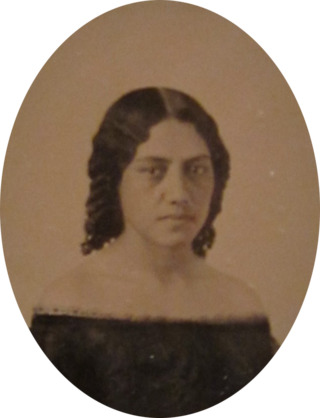
Elizabeth Kekaʻaniau Laʻanui Pratt, full name Elizabeth Kekaʻaniauokalani Kalaninuiohilaukapu Kekaikuihala Laʻanui Pratt, was a Hawaiian high chiefess (aliʻi) and great-grandniece of Kamehameha I, being a great-granddaughter of Kalokuokamaile, the older brother of Kamehameha I, founder of the Kingdom of Hawaii. She was the daughter of Gideon Peleʻioholani Laʻanui and Theresa Owana Kaheiheimalie Rives.
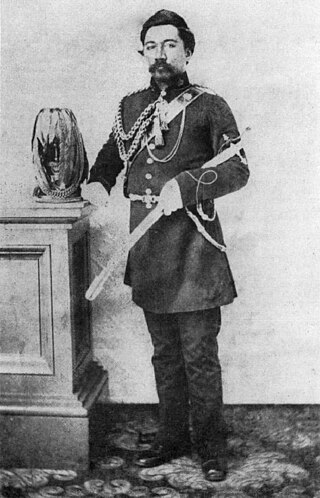
Peter Young Kaʻeo Kekuaokalani was a Hawaiian high chief (aliʻi) and politician of the Kingdom of Hawaii. His cousin was Emma, who contended for the throne after the death of Kamehameha. After being diagnosed with leprosy, he was exiled in 1873 to Kalaupapa, the isolation settlement on Molokaʻ. He was later permitted to return to Honolulu, where he died.

Samuel Mānaiakalani Kamakau was a Hawaiian historian and scholar. His work appeared in local newspapers and was later compiled into books, becoming an invaluable resource on the Hawaiian people, Hawaiian culture, and Hawaiian language while they were disappearing.

Lorrin Andrews was an early American missionary to Hawaii and judge. He opened the first post-secondary school for Hawaiians called Lahainaluna Seminary, prepared a Hawaiian dictionary and several works on the literature and antiquities of the Hawaiians. His students published the first newspaper, and were involved in the first case of counterfeiting currency in Hawaii. He later served as a judge and became a member of Hawaii's first Supreme Court.

William DeWitt Alexander was an educator, author and linguist in the Kingdom of Hawaii and Republic of Hawaii. He then constructed maps for the Territory of Hawaii.
Richard Henry Stanley was an American lawyer who served as politician and cabinet member of the Kingdom of Hawaii.

Samuel Gardner Wilder was an American shipping magnate and politician who developed a major transportation company in the Kingdom of Hawaii.

The Honolulu Courthouse riot, or the Election riot, occurred in February 1874 when Hawaiian followers of Queen Emma, known as Emmaites, attacked supporters of King Kalakaua on the latter's election day and started a riot. Marines and sailors from three American and British warships were landed and they successfully quelled the rioters and Kalakaua took the oath of office the following day without further opposition.
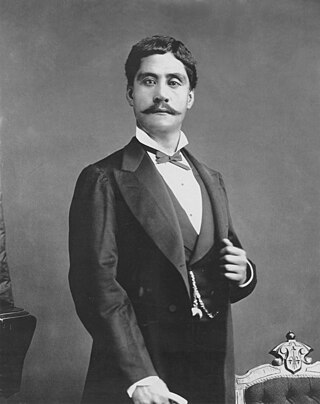
Albert Kūkaʻilimoku Kūnuiākea was the illegitimate son of King Kamehameha III and his mistress Jane Lahilahi. He served as a politician in the Kingdom of Hawaii and the Republic of Hawaii. He later was baptized into the Anglican Church of Hawaii with the name Albert Fredrick Kunuiakea Oiwiaulani Koenaokalani.
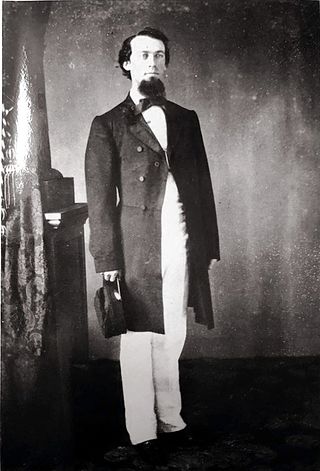
Franklin Seaver Pratt, also known as Franklyn or Frank S. Pratt, was an American businessman, public servant and diplomat of the Kingdom of Hawaii. He served as the Hawaiian consul for the Pacific States of California, Nevada, Oregon, and Washington around the time of the overthrow of the Kingdom of Hawaii in 1893. Pratt married Elizabeth Kekaʻaniau Laʻanui, a member of Hawaiian nobility, and he defended her claims to the Hawaiian crown lands during the overthrow. He died shortly after his return to Hawaii.

J. W. Lonoaea was a politician of the Kingdom of Hawaiʻi who served in the House of Representatives of the Legislature of the Kingdom from 1872 until his death. Following the death of King Lunalilo, it fell to the legislature to choose the next monarch from amongst the native-born high chiefs, though only three candidates were considered seriously: Bernice Pauahi Bishop, David Kalākaua, and Queen Emma. Lonoaea voted with the majority in supporting Kalākaua, and was one of the thirteen legislators to be injured by supporters of Queen Emma in the ensuing 1874 Honolulu Courthouse riot. Lonoaea was the only legislator who did not survive his injuries.

George Washington Pilipō was a politician of the Kingdom of Hawaii. He served as a member of the House of Representative from North Kona (1860–1884) and Reverend of Kaumakapili Church. Considered one of the leading Hawaiian politicians of his generation, he was known as "Ka Liona o Kona Akau", or "The Lion of North Kona".

Kalākaua was the last king and penultimate monarch of the Kingdom of Hawaiʻi. The inherited position of the kingdom's monarch became a legislatively elected office with Lunalilo. Upon Lunalilo's death, Kalākaua won election over his political opponent Queen Emma. He reigned from February 12, 1874, until his death in San Francisco, California, on January 20, 1891.
Esther Takakura Mookini is an American linguist responsible for several widely used Hawaiian-language dictionaries.
References
- ↑ Johnson, Donald D. (1992). "Notes on the History of the Hawaiian Historical Society: A Centennial Year Observation" (PDF). Hawaiian Journal of History . 26: 1–20.
- ↑ Forbes, David W. (1992). Treasures of Hawaiian History: from the collection of the Hawaiian Historical Society. Hawaiian Historical Society.
- ↑ Johnson, Donald D. (1992). "Hawaiian Journal of History". University of Hawaiʻi at Mānoa . Retrieved November 27, 2016.
- ↑ Dabagh, Jean; Lyons, Curtis Jere; Hitchcock, Harvey Rexford (1974). Dabagh, Jean (ed.). "A King is Elected: One Hundred Years Ago" (PDF). Hawaiian Journal of History . 8: 76–89.
- ↑ "About the Hawaiian Historical Society". Hawaiian Historical Society. Retrieved November 27, 2016.